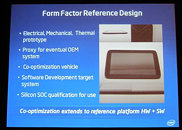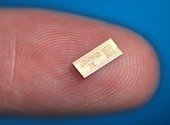qubit
Overclocked quantum bit
- Joined
- Dec 6, 2007
- Messages
- 17,865 (2.84/day)
- Location
- Quantum Well UK
| System Name | Quantumville™ |
|---|---|
| Processor | Intel Core i7-2700K @ 4GHz |
| Motherboard | Asus P8Z68-V PRO/GEN3 |
| Cooling | Noctua NH-D14 |
| Memory | 16GB (2 x 8GB Corsair Vengeance Black DDR3 PC3-12800 C9 1600MHz) |
| Video Card(s) | MSI RTX 2080 SUPER Gaming X Trio |
| Storage | Samsung 850 Pro 256GB | WD Black 4TB | WD Blue 6TB |
| Display(s) | ASUS ROG Strix XG27UQR (4K, 144Hz, G-SYNC compatible) | Asus MG28UQ (4K, 60Hz, FreeSync compatible) |
| Case | Cooler Master HAF 922 |
| Audio Device(s) | Creative Sound Blaster X-Fi Fatal1ty PCIe |
| Power Supply | Corsair AX1600i |
| Mouse | Microsoft Intellimouse Pro - Black Shadow |
| Keyboard | Yes |
| Software | Windows 10 Pro 64-bit |
VR-Zone have been having a little chat with Intel 'sources', who have leaked some juicy tidbits for us to enjoy in the form performance and power news. The upcoming next generation Medfield platform is Intel's first true System on a Chip (SoC) and is designed to compete with various low power ARM offerings in the tablet space. To help achieve this, they've gone through an internal restructure, merging four business units into just one: Ultra-Mobility, Mobile Wireless, Mobile Communications and Netbook & Tablet PC. The business unit is now simply known as Mobile and Communications. It's being run by Mike Bell and Hermann Eul and the first product to emerge from it will be is the 32 nm Medfield SoC solution.
VR-Zone explained that the competition will be "Apple's A-Series, NVIDIA Tegra, Qualcomm Snapdragon, Samsung Exynos, Texas Instruments OMAP and the likes. Out of all the chips mentioned above, only Samsung's Exynos is currently manufactured in 32nm process, just like Medfield."


There's currently a tablet prototype in Intel's labs based on this chip, which has the following specifications: 1.6 GHz Medfield SoC, 1GB LP-DDR2 (LP = low power) a WLAN/Bluetooth/FM radio chip of unknown origin, eMMC/micro-SD card slot and a 10.1" screen with 1280x800 resolution.
This prototype has been benchmarked using Android 3.x (Honeycomb), while the finished products will be on Android 4.x (Ice Cream Sandwich). In Caffeine 3 it scored around 10,500 points, while the competition scored:
- 7500 points (NVIDIA Tegra 2)
- 8000 points (Qualcomm Snapdragon MSM8260
- 8500 points (Samsung Exynos)
As you can see, it gives its ARM competition quite a kicking. There are more test results, but these haven't been revealed. Let's move on now to battery life and this is where power consumption is king. ARM is still top dog here, so Intel is looking to improve the current power consumption figures:
- 2.6 W in idle, with 2 W being the target
- 3.6 W worst case when playing back 720p video in Adobe Flash format, with 2.6 W worst case being the target
With Medfield due soon, the ultra portable market looks set to become very interesting, especially as the huge number of x86 apps can be run on it and this platform is expected to be showcased very soon at CES 2012.
View at TechPowerUp Main Site
VR-Zone explained that the competition will be "Apple's A-Series, NVIDIA Tegra, Qualcomm Snapdragon, Samsung Exynos, Texas Instruments OMAP and the likes. Out of all the chips mentioned above, only Samsung's Exynos is currently manufactured in 32nm process, just like Medfield."


There's currently a tablet prototype in Intel's labs based on this chip, which has the following specifications: 1.6 GHz Medfield SoC, 1GB LP-DDR2 (LP = low power) a WLAN/Bluetooth/FM radio chip of unknown origin, eMMC/micro-SD card slot and a 10.1" screen with 1280x800 resolution.
This prototype has been benchmarked using Android 3.x (Honeycomb), while the finished products will be on Android 4.x (Ice Cream Sandwich). In Caffeine 3 it scored around 10,500 points, while the competition scored:
- 7500 points (NVIDIA Tegra 2)
- 8000 points (Qualcomm Snapdragon MSM8260
- 8500 points (Samsung Exynos)
As you can see, it gives its ARM competition quite a kicking. There are more test results, but these haven't been revealed. Let's move on now to battery life and this is where power consumption is king. ARM is still top dog here, so Intel is looking to improve the current power consumption figures:
- 2.6 W in idle, with 2 W being the target
- 3.6 W worst case when playing back 720p video in Adobe Flash format, with 2.6 W worst case being the target
With Medfield due soon, the ultra portable market looks set to become very interesting, especially as the huge number of x86 apps can be run on it and this platform is expected to be showcased very soon at CES 2012.
View at TechPowerUp Main Site
Last edited:








 Intel is most certainly not sitting on its hands with this one!
Intel is most certainly not sitting on its hands with this one!